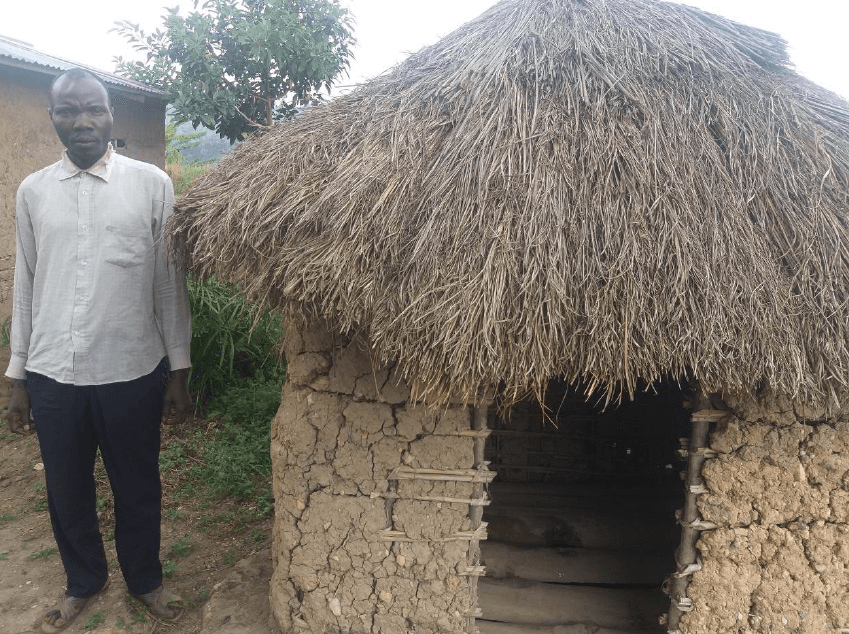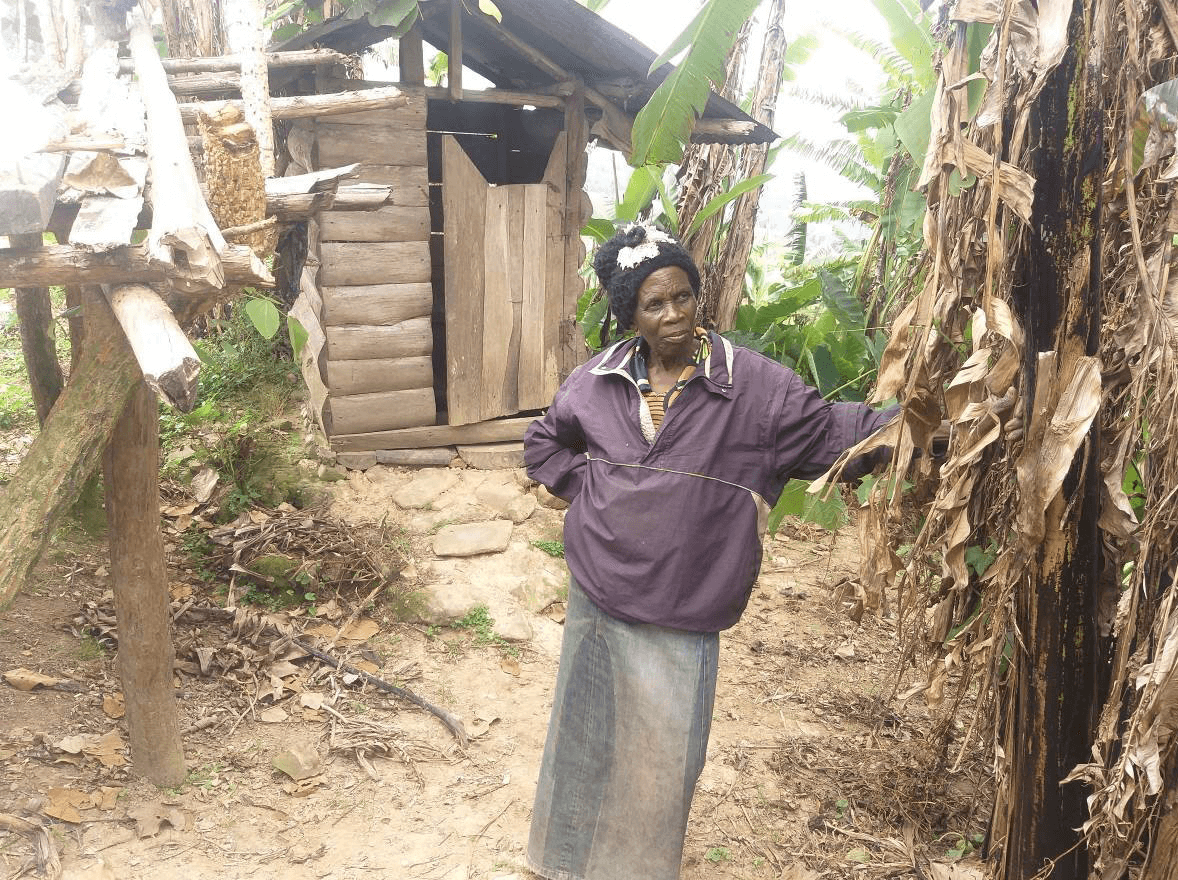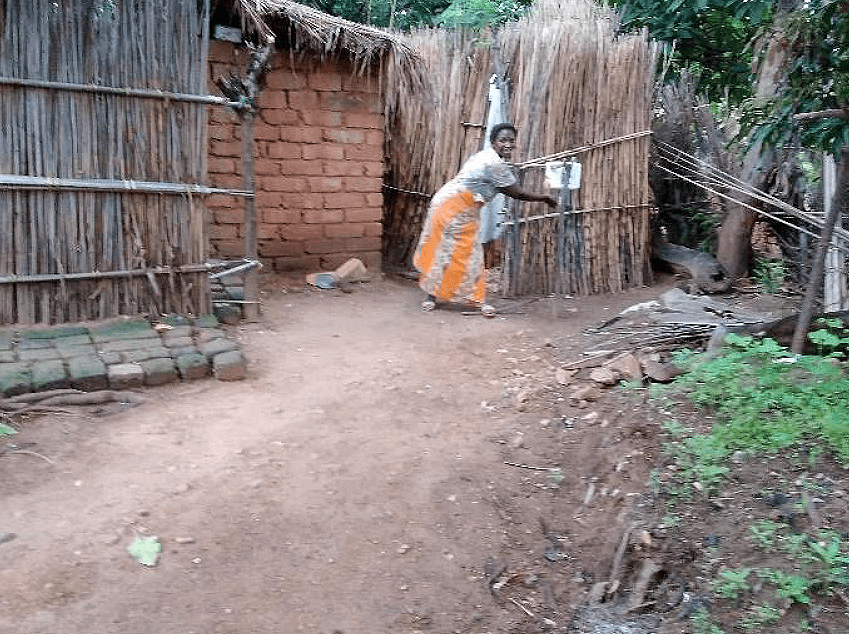Mathias Kambale Kaputu’s testimony
Mathias Kambale Kaputu’s testimony,
Bweteta 1 village
Baswagha chiefdom
Musienene health zone
Lubero Territory
North Kivu, Democratic Republic of Congo

Story of transformation
Mathias Kambale Kaputu is a 44-year-old father-of-six living in Bweteta 1 village, Lubero Territory in North Kivu. He and his wife have four boys and two girls.
Mathias works at Horizon Hospital as a night watchman but during the day, he and his wife work their land. Agriculture is their main source of income as they sell their produce to pay for things such as the children’s school fees, clothes and medicine. Mathias’ monthly salary enables them to buy other food, to give them a more varied diet, and provides for unforeseen expenses.
In May 2020, they had to flee their home because of escalating violence in the area, and were only able to return three months ago, at the start of 2021.
‘We did not have the idea of building our own latrine on our plot because we defecated in the bush without realising the negative consequences associated with it.
My family members used to suffer diarrhoeal diseases which caused us to need regular medical care, and I was worried because I was spending a lot on hospital costs.
But for three months now, Toilet Twinning’s partner has been helping us understand the causes of diarrhoeal diseases and the usefulness of a family latrine.
So, my wife and I took the decision to build this latrine. It doesn’t have a door, as we’ve not been able to afford one yet, which means that other people can easily use it. But I’m going to work hard to install a door, and a handwashing station now. I’ve also finished digging a rubbish pit for our household waste.
I am convinced that diarrhoeal diseases will no longer be a problem for my family and I have become a ‘community sensitiser’, spreading the word to encourage my neighbours to dig their own latrine, install a handwashing station and dig a rubbish pit.
The money I wasted on medical care will now help me educate my daughter and my younger son who are studying at Bweteta Primary School.
I warmly thank Toilet Twinning and its partners for coming to Bweteta village to teach us about good hygiene and sanitation, which now protects us from diarrhoeal diseases and those caused by having dirty hands.
I and my community hope Toilet Twinning and their projects can be successful and continue helping many families improve their living conditions.
Kabira Kibinda Domitile’s testimony
Kabira Kibinda Domitile’s testimony
Bweteta village
Musienene health zone
North Kivu, Democratic Republic of Congo

Story of transformation
Kabira Kibinda Domitile was forced to flee her home in North Kivu when conflict overtook the area and only returned six months ago. The 63-year-old and her husband are reliant on their land to feed their family. They have three sons and three daughters.
This latrine was built by my children who saw that their father and I could not continue going into the banana plantations to go to the toilet.
I am convinced that the work that Toilet Twinning’s partners did to sensitise us on about good hygiene and sanitation has been successful in our community because many families today are digging their own latrine and a pit to manage their household waste.
Toilet Twinning partners reinforced the message on the consequences of not having a family latrine. They insisted that many germs come from open defecation which affects humans and causes diseases such as cholera and the like.
We are very grateful to Toilet Twinning and its partners for teaching us about building latrines, digging rubbish pits and installing handwashing stations. The success of these practices in our community will reduce the cases of diarrhoeal diseases and other contagious diseases such as Ebola and coronavirus.
My wish is to see other villages being helped, ones which are in need as ours was before. Thank you very much and may God bless you abundantly in your work.
Maria Kalumbilo Bity’s testimony
Maria Kalumbilo Bity’s testimony
Kabumbu 1 village
Moba Territory
Tanganyika Province
Democratic Republic of Congo

Story of transformation
Maria Kalumbilo Bity smiles broadly as she talks of the changes to her village since Toilet Twinning partners started working there. The 31-year-old mother-of-three says that children in the village used to go to the toilet anywhere in the community: most adults, including Maria and her husband Dominique, went late at night to the shores of Lake Tanganyika to relieve themselves. They used to collect water from the lake for cooking and other household uses: for their drinking water, they went to Lufuko River. As a result of water contamination, the area has long suffered with cholera outbreaks, largely due to a lack of awareness about good hygiene and sanitation. Mortality rates linked to water-borne diseases have been high.
Our family were not spared. The children regularly suffered from diarrhoea. Every month, you inevitably had a case of diarrhoeal disease among the children and we didn’t know how to tackle the real causes of the problem. Our money situation was really bad because we spent so much on medical care.
When Toilet Twinning partners came, they did sensitisation activities and set up community action plans in the villages. They also set up local water and sanitation committees which now play a big role in our community. Now, the majority of the population already understand the reason for handwashing and how to make a handwashing station, such as a tippy tap (see photo, right).
Since Toilet Twinning partners arrived, there has been a significant change in the behaviour of people in our community and particularly in my family. Today, it is very rare to see a household in our village without a latrine of some kind.
For almost six months now, our children have had not stomach aches (and there’s been no case of diarrhoeal disease), and that means our economic situation is much more stable. I salute the people who provided the funding for this project and the partners who implemented it.
This project really is a relief for me and for the community because of the initiatives that it is encouraging. To show my full support and my commitment to this project, I decided to devote my time to sensitising other people and raising awareness of good hygiene and sanitation practices as part of what we call the community relay team.